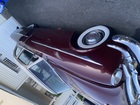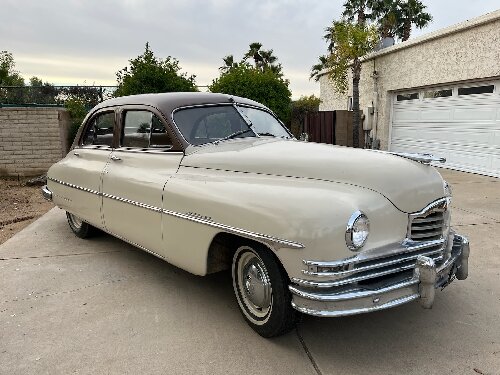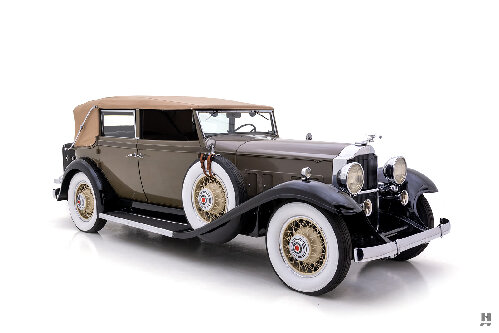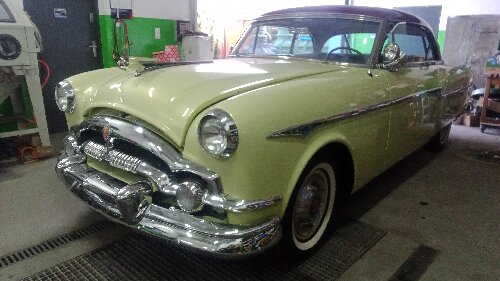|
Re: What are you all doing for exhaust?
|
||||
|---|---|---|---|---|
|
Just can't stay away
|
I'm 27... I always build my cars as quiet as possible. Engine noise does absolutely nothing for me unless it has more than 500 horsepower to back it up.
Fast and loud is good. Slow and loud is just annoying.
Posted on: 2022/11/29 14:42
|
|||
|
1955 Patrician.
|
||||
|
||||
|
Re: What are you all doing for exhaust?
|
||||
|---|---|---|---|---|
|
Just can't stay away
|
What about Waldron's Exhaust?
Posted on: 2022/11/26 19:26
|
|||
|
1955 Patrician.
|
||||
|
||||
|
Re: Having trouble starting my 400...
|
||||
|---|---|---|---|---|
|
Just can't stay away
|
Oh man...somebody incompetent and used to working on Chevrolets has really goofed up your fuel system.
Worry about it later. For now, fill the carburetor bowls with gas manually through the vents. It should run for 30 seconds or so just on the gas that is held in the carburetor. Figure out why it won't start first and attack the fuel line situation later.
Posted on: 2022/11/13 2:37
|
|||
|
1955 Patrician.
|
||||
|
||||
|
What are you all doing for exhaust?
|
||||
|---|---|---|---|---|
|
Just can't stay away
|
My car currently has two 8x5x14-inch oval universal turbo mufflers in the stock locations with no resonators and it's too noisy...meaning I can hear it. A luxury car like a Packard should not be heard.
I think two of these mufflers will do nicely. They approximate the size and shape of the original Packard mufflers: https://www.summitracing.com/parts/WLK-21314 Then I'll move the current turbo mufflers towards the back to function as resonators. Do you think those turbos will make good resonators, or should I pick something else?
Posted on: 2022/10/22 23:08
|
|||
|
1955 Patrician.
|
||||
|
||||
|
Re: Brake Noise & Fading
|
||||
|---|---|---|---|---|
|
Just can't stay away
|
You probably don't have them adjusted tight enough. The shoes should lightly drag when they are adjusted properly. You spin the wheel in the forward direction of road travel by hand while tightening the adjuster until the wheel becomes hard to turn. It'll just about lock up suddenly. Then you back off the adjuster a few notches to get a light drag.
These are big brakes. They stop quite well when they are operating correctly.
Posted on: 2022/10/22 2:18
|
|||
|
1955 Patrician.
|
||||
|
||||
|
Re: Twin Ultramatic Lifespan.
|
||||
|---|---|---|---|---|
|
Just can't stay away
|
Good to hear. You've been very helpful, Ross. Thank you.
Driving in "H" for you 1956'ers or (^D) for us 1955'ers isn't very pleasant for me at my 7000 feet above sea level. Any naturally aspirated engine is down on torque by at least 23% up here, and lugging a 4600 pound Packard off the line with nothing but a torque converter is not much fun when you are missing that much torque. There is no doubt that these cars have plenty of thrust once they are out on the open road. The Packard V8 is one heck of a low RPM slugger. There is a long and steep 65 mph highway grade near my house that climbs up to nearly 8000 feet. It's a good road test for engine power. My Packard has no trouble on it. I was really impressed the first time I did it. Even the most powerful cars feel that grade.
Posted on: 2022/10/18 2:27
|
|||
|
1955 Patrician.
|
||||
|
||||
|
Re: Twin Ultramatic Lifespan.
|
||||
|---|---|---|---|---|
|
Just can't stay away
|
Is the key to long Twin Ultramatic life in proper maintenance and adjustment, or is it in always driving in high range with a light foot?
I'd rather not be a slow slug in the right lane all the time to save my transmission, but if that's what I must do...
Posted on: 2022/10/17 2:35
|
|||
|
1955 Patrician.
|
||||
|
||||
|
Re: Twin Ultramatic Lifespan.
|
||||
|---|---|---|---|---|
|
Just can't stay away
|
Quote:
When you speak of the throttle pressure setting, are you referring to the linkage adjustment on the carburetor or the pressure adjustment screw on the valve body? It sounds like you recomend an auxiliary oil to air cooler to increase the lifespan of an Ultramatic. What mileage do you see most Ultramatics fail or need rebuilt at?
Posted on: 2022/10/12 15:21
|
|||
|
1955 Patrician.
|
||||
|
||||
|
Twin Ultramatic Lifespan.
|
||||
|---|---|---|---|---|
|
Just can't stay away
|
My February of 1955 TU has 65,000 original miles. It's never been rebuilt. I know the answer to this question is completely subjective and dependent on so many things, but...how much longer does it likely have before it takes a dump and leaves me stranded way out in BFE?
I fully serviced it with a complete drain and refill of Type F (getting the bell housing off to drain the converter SUCKS!!!), adjusted the bands, adjusted the selector linkage, and adjusted the throttle linkage. There was more metallic gray sludge in the pan than I am used to seeing on 1970's automatics, but maybe that is normal for TU's, and I do not know the last time it was changed. It shifts perfectly. No flare or hang-up between low and high and it's smooth. The converter lockup to direct drive happens very smoothly. There is no "groan" or "moo", just a smooth slide into direct drive. I actually wish it was less of a slide and more of a firm shift to save wear on the clutch. I've developed the habit of lifting off the throttle at around 30 mph to make it lock quickly and not under load to save wear. I moved the adjusting link on the throttle rod rearwards about 3/8" to make the transmission think the throttle way farther open. I thought this would raise the shift points and firm them up, reducing wear on the transmission. It's a trick the Mopar guys use on Torque Flites. It did raise and firm-up the shifts at first, but then one day it suddenly got really bad flare between shifts and slipping in all drive ranges. It scared the living daylights out of me. I thought my transmission was dying. Talk about being white as a ghost! Fortunately, I was barely outside my driveway. I adjusted the linkage back to factory setting and it's been 100% fine ever since. I don't know why it would do that. It goes against logic. Maybe the selector was between ranges or the governor stuck. I don't know, but I sure as heck am never doing that again! That was scary as #^@$$. Anyway, so...do Twin Ultramatics usually make it to 100,000 miles before needing rebuilt? Thanks.
Posted on: 2022/10/11 3:30
|
|||
|
1955 Patrician.
|
||||
|
||||








